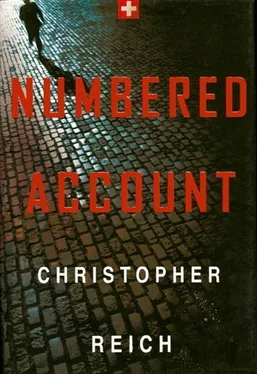Nick breathed easier and did as he was told. He walked sheepishly to the table, still shaking his head at his careless behavior. He was probably overacting.
The activity in the office had increased. Eight or nine people waited in line. Still, the room was absolutely silent. “Church mice,” Nick would have said to his infantry platoon when silent running was an operational necessity. Only the shuffling of paper and one secretary’s itchy throat marred the calm.
“Herr Sprecher?”
Nick jumped to his feet, fearful that someone might recognize him. He scanned the room. No one looked at him oddly.
Karl held a sepia folder in both his hands. “Here is your file. You may not remove any of its contents. You may not leave it unattended, even if you have to go to the toilet. Bring it directly to me when you are finished. Understood?”
Nick said he understood. He took the file from Karl and started back to the reading table.
“Herr Sprecher?” Karl asked unsurely. “That is correct, isn’t it?”
Nick turned. “Yes,” he answered confidently, waiting for someone to call him an impostor.
“You remind me of a boy I used to know a long time ago. He worked with me. Name wasn’t Sprecher, though.” Karl shrugged his shoulders and went back to work.
* * *
It was a thick file, as big as a textbook and twice as heavy. Nick turned the folder horizontally to check the tab. 549.617 RR was typed in heavy black script. He relaxed and opened the cover. Signature sheets were stapled to the left-hand side. The sheets listed the names of the bank executives who had previously requested the file. Cerruti’s name was written on ten or eleven lines, interrupted once by Peter Sprecher’s. The name Becker popped up half a dozen times all within a six-month period. Then Cerruti again and before him, something illegible. Lift the sheet and go back in time, mid-eighties. Another page, more names. Back again. And finally, at the top of the first page, a signature he knew well. The date: 1980. He traced the bold curves of the signature with his pen. Wolfgang Kaiser. Chalk up another run in Sterling Thorne’s column, thought Nick. Irrefutable proof the Chairman knew Mr. Ali Mevlevi.
Nick turned his attention to the manila folder marked “client mail” sitting loose on top of the right-hand page. The folder held a pile of unclaimed correspondence: official confirmations of every transaction completed for benefit of the Pasha’s account. As was common for numbered accounts, all mail was held at the bank until such time as the account holder wanted to review it. The stack wasn’t very thick. Marco Cerruti must have delivered a bundle during his most recent visit. Nick counted approximately thirty envelopes. One corresponding for each incoming and outgoing wire transfer plus two month-end statements, the one for February dated only yesterday.
Nick closed the manila folder and slid it onto the signature sheet. A sheaf of transaction confirmations two fingers in height was attached to the right outermost cover of the file. Perusing them, he saw that the stack contained a record of all confirmations sent to the holder of account 549.617 RR. Every incoming wire, every outgoing wire since the account was opened. At the bottom of the stack was a copy of each of the seven matrices listing the name of every bank and every account number to which the Pasha’s funds were to be wired. To Sterling Thorne, the matrices would prove more valuable than any treasure map, more inculpatory than any confession. With them, he could trace the flow of funds from USB to fifty or sixty banks around the world. Sure it was only one step in what was no doubt a circuitous route. But it was the first step, and as such, the most important.
Nick studied the incoming wire transfers for the final three months of the previous year. Rules forbade the copying of any information in the files. It was strictly “for his eyes only.” As well as he could, he memorized the amounts that arrived on each Monday and Thursday. He totaled the dollar value of the transactions for each week and set them in a column inside his head. When he got as far back as October, his mind failed him. It was as if a screen went blank, a momentary short circuit. He began again, reading in reverse chronological order the transfers made from December 31 back through September 30, totaling the figures weekly. Thirteen numbers stood out clearly in his mind. He ran his mind’s eye down the column, summing the eight-digit figures. Finished, he memorized the sum. In three months, $678 million had passed through the Pasha’s account.
Nick raised his head and found Karl staring unabashedly at him. “Who are you, really?” he seemed to be asking.
Nick returned his attention to the folder. He had come to steal the unclaimed transaction confirmations. The envelopes held hard-copy proof that the client was violating the rules against money laundering as prescribed by the DEA. They also proved that USB knowingly facilitated such contraventions. In his jacket pocket were a dozen envelopes identical to those in the file below him. He had typed the Pasha’s account number on every envelope and placed a folded sheet of blank paper inside. Keeping his eyes glued to the papers below him, he slid the phony confirmations out of his pocket and tucked them under his leg. Now he had to wait for a person to enter and divert Karl’s attention.
Nick checked the time. It was 10:35. He should be at his desk selling off shares. Feller would have noticed his absence by now. The little zealot had adopted the habit of phoning every fifteen minutes to keep a running tally of the dollar value of shares Nick had sold. Just this morning, Nick had generated sell orders for over eight million dollars and had issued buy orders for a corresponding amount of USB shares. Maeder’s plan was going off without a hitch.
Time passed slowly. DZ was deserted. Ten minutes ago, the room had been packed. Now it was empty. Where in the hell had everybody gone? He couldn’t wait here forever. Nick snuck a glance at Karl. The old coot was still staring right at him.
A few minutes later, the door creaked halfway open and then closed. False alarm. Nick blew out his breath anxiously. The last thing he needed was for Feller to start searching all over the place for him. He had to get back to the Fourth Floor. A single bead of sweat formed at the top of his spine. He could feel it roll the length of his back. He lifted his hand from the desk and saw that he had left a moist imprint. He wiped his palm on the seam of his pants.
At 11:05, a dark-haired man walked into the room. He was a clerk returning from the lavatory. Nick waited until he approached the service counter, then counted to three and extracted the transaction confirmations from the Pasha’s dossier. Sure not to raise his head, he brushed the unmailed letters into his lap. With his right hand, he removed the dozen surrogate confirmations from under his thigh and placed them into the dossier. Still keeping his head immobile above the dossier, he arranged the stolen letters into a neat stack and in one assured motion deposited them in the inside pocket of his jacket. Every letter slid in smoothly. Except one. One envelope protruded from his jacket for all the world to see. Nick flung his elbow in a wide arc and repeatedly jammed the envelope into his jacket. Three times he tried to stuff it into his jacket. On the fourth try the letter slipped in.
Nick waited for the alarm to sound. Karl must have noticed. One of the secretaries had to have seen his bungled burglary. Nothing happened. Daring a glance toward the counter, Nick saw that Karl was staring directly at him. Why hadn’t the old codger spotted his brazen theft?
Nick rearranged the Pasha’s dossier so that all was neat and orderly. As he approached the counter, he looked past Karl and saw that the young secretaries behind him were laughing. Nick returned his eyes to the keeper of Dokumentation Zentrale. He was leaning over the counter, his chin resting comfortably on his palm. His bifocals sat precariously at the end of his nose, and his eyes were closed.
Читать дальше












